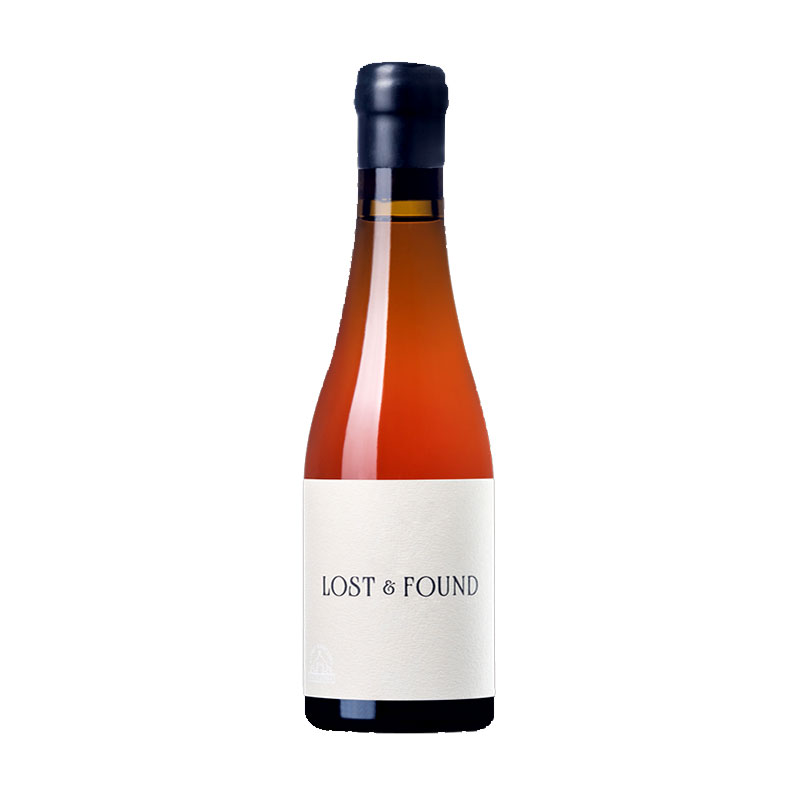As one of South Africa’s newest producers, Alheit Vineyard declares its aim as being ‘to vinify extraordinary Cape vineyards’. The fact that Chris and Suzaan Alheit set out on their venture to make only white wine, is a testament to their commitment to seek out some of the oldest vineyard blocks in the country. Using the knowledge and contacts of leading viticulturist, Rosa Kruger, within two short years, Alheit Vineyards has established itself as the most talked about winery in the Cape, with its limited releases being highly sought-after. Winery space is rented in shed, originally conceived as an olive oil production facility, on the Hemel-en-Aarde road out of Hermanus. Probably as far away as one could expect to be from their primary grape sources on the West Coast.
Alheit Vineyards Lost and Found 37.5cl 2019
7% abv
“The maiden (and alas, final) 2019 Lost & Found is Chris Alheit’s foray into sweet wines made entirely from Hanepoot, the local name for Muscat d’Alexandria, from a single vineyard in Breedekloof. Burnished amber in color, it has a captivating bouquet of marmalade, quince and mango notes, all very pure and beautifully defined. The palate is well balanced and viscous in texture, offering marmalade and quince on the entry. It actually reminds me of a Tokay Eszencia, but it is all kept amazingly fresh thanks to the razor-sharp acidity. A spellbinding sweet debut for Chris Alheit, but then again, I didn’t expect anything less. Grab this one-off while you can.” 2022 – 2050
96 Points, Neal Martin, Vinous, April 2021
This extract, written by Chris Alheit, is from the fiche that accompanies the wine in the case:
Gevonden is the name of a farm not far from Rawsonville at the spot where the sheer cliffs of Du Toitskloof open up into the Breedekloof. The three-century old farmhouse lies just across the Moolenars river, tucked up against the mountains. Right in front of the farmhouse is a vineyard considered by many to be the oldest commercially productive parcel of vines in South Africa.
In the Cape, official record keeping of vineyard plantings dates started in 1900, so unfortunately nothing can be officially pre-date that year. We do know that Gevonden was recorded as being productive in 1900. According to the De Wet/Boonzaaier family history, these Hanepoot vines were in fact planted by one Jacobus Hendrik Stofberg De Wet in 1882.
We came to know about this vineyard via Old Vine matriarch, Rosa Kruger, who introduced us to Neels Boonzaaier in late 2010. We were quite fired up about it and tried to make a straw wine in 2011. It was a total disaster. Feeling disheartened, we abandoned the project until a chance meeting with Janus Boonzaaier in 2017, having taken over from his father. The 2018 was not bad, but not thrilling. After two expensive trials, we felt we could make a good wine in 2019.
We paid much attention to the viticulture that season. So it was, in the 2019 vintage we had a good sized crop that attained full ripeness by mid-March. Janus spread the grapes on wooden racks and on shade cloth. We let them dry outside for two full weeks, collecting the grapes on the 2nd April. The resulting wine was pressed for 5 days at full pressure, yielding a syrup of around 55 Brix. This juice fermented for a year, reaching just over 7% alcohol and a residual sugar of around 425g/l.
The wine sits in the glass like a smouldering ember; joyous, full of sunshine, reeking of apricots and Muscat and marmalade. It tastes completely decadent. Fiery and silky; sweet and sour. I hope to live long enough to taste it after a few decades in bottle.
The 2019 is also the final vintage farmed by the family who owned Gevonden for 6 generations. We hope this wine transports you back to a different age, fills you with nostalgia, gives you a sense of perspective on the fleeting nature of life.
Explore More:
2019 | Africa | Alheit Vineyards | Dessert | Duty Paid | Muscat (Moscato/Moscatel) | South Africa | Western Cape | White | Wine- Reference #:
- 15649
- Strength
- 7 ABV
- Bottles per Case
- 6 bottles
- Grapes
- Muscat (Moscato/Moscatel)
- Organic
- No
- Biodynamic
- No
- Vegan
- Yes
- Vegetarian
- Yes
- Sparkling
- No

